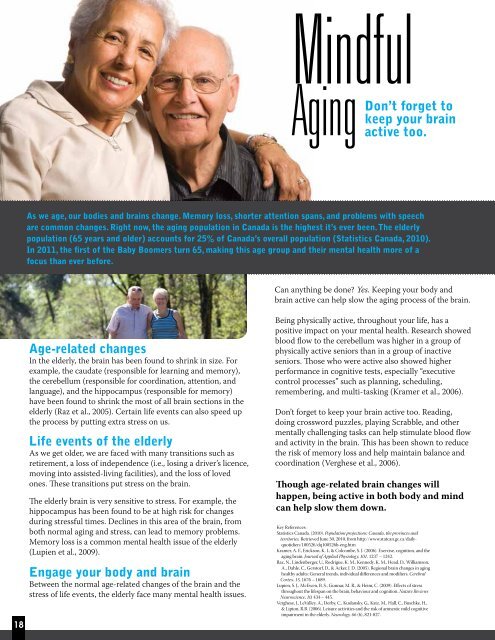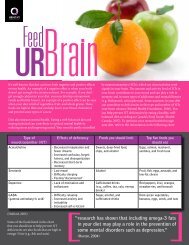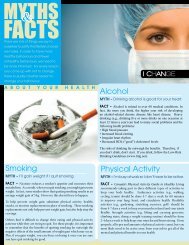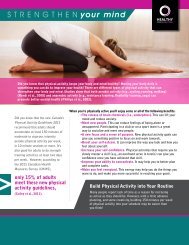Healthy Minds Matter Newsletter and Brochure (pdf)
Healthy Minds Matter Newsletter and Brochure (pdf)
Healthy Minds Matter Newsletter and Brochure (pdf)
Create successful ePaper yourself
Turn your PDF publications into a flip-book with our unique Google optimized e-Paper software.
MindfulDon’t forget tokeep your brainactive too.AgingAs we age, our bodies <strong>and</strong> brains change. Memory loss, shorter attention spans, <strong>and</strong> problems with speechare common changes. Right now, the aging population in Canada is the highest it’s ever been. The elderlypopulation (65 years <strong>and</strong> older) accounts for 25% of Canada’s overall population (Statistics Canada, 2010).In 2011, the first of the Baby Boomers turn 65, making this age group <strong>and</strong> their mental health more of afocus than ever before.Can anything be done? Yes. Keeping your body <strong>and</strong>brain active can help slow the aging process of the brain.18Age-related changesIn the elderly, the brain has been found to shrink in size. Forexample, the caudate (responsible for learning <strong>and</strong> memory),the cerebellum (responsible for coordination, attention, <strong>and</strong>language), <strong>and</strong> the hippocampus (responsible for memory)have been found to shrink the most of all brain sections in theelderly (Raz et al., 2005). Certain life events can also speed upthe process by putting extra stress on us.Life events of the elderlyAs we get older, we are faced with many transitions such asretirement, a loss of independence (i.e., losing a driver’s licence,moving into assisted-living facilities), <strong>and</strong> the loss of lovedones. These transitions put stress on the brain.The elderly brain is very sensitive to stress. For example, thehippocampus has been found to be at high risk for changesduring stressful times. Declines in this area of the brain, fromboth normal aging <strong>and</strong> stress, can lead to memory problems.Memory loss is a common mental health issue of the elderly(Lupien et al., 2009).Engage your body <strong>and</strong> brainBetween the normal age-related changes of the brain <strong>and</strong> thestress of life events, the elderly face many mental health issues.Being physically active, throughout your life, has apositive impact on your mental health. Research showedblood flow to the cerebellum was higher in a group ofphysically active seniors than in a group of inactiveseniors. Those who were active also showed higherperformance in cognitive tests, especially “executivecontrol processes” such as planning, scheduling,remembering, <strong>and</strong> multi-tasking (Kramer et al., 2006).Don’t forget to keep your brain active too. Reading,doing crossword puzzles, playing Scrabble, <strong>and</strong> othermentally challenging tasks can help stimulate blood flow<strong>and</strong> activity in the brain. This has been shown to reducethe risk of memory loss <strong>and</strong> help maintain balance <strong>and</strong>coordination (Verghese et al., 2006).Though age-related brain changes willhappen, being active in both body <strong>and</strong> mindcan help slow them down.Key References:Statistics Canada. (2010). Population projections: Canada, the provinces <strong>and</strong>territories. Retrieved June 30, 2010, from http://www.statcan.gc.ca/dailyquotidien/100526/dq100526b-eng.htmKramer, A. F., Erickson, K. I., & Colcombe, S. J. (2006). Exercise, cognition, <strong>and</strong> theaging brain. Journal of Applied Physiology, 101, 1237 – 1242.Raz, N., Lindenberger, U., Rodrigue, K. M., Kennedy, K. M., Head, D., Williamson,A., Dahle, C., Gerstorf, D., & Acker, J. D. (2005). Regional brain changes in aginghealthy adults: General trends, individual differences <strong>and</strong> modifiers. CerebralCortex, 15, 1676 – 1689.Lupien, S. J., McEwen, B. S., Gunnar, M. R., & Heim, C. (2009). Effects of stressthroughout the lifespan on the brain, behaviour <strong>and</strong> cognition. Nature ReviewsNeuroscience, 10, 434 – 445.Verghese, J., LeValley, A., Derby, C., Kuslansky, G., Katz, M., Hall, C., Buschke, H.,& Lipton, R.B. (2006). Leisure activities <strong>and</strong> the risk of amnestic mild cognitiveimpairment in the elderly. Neurology, 66 (6), 821-827.







